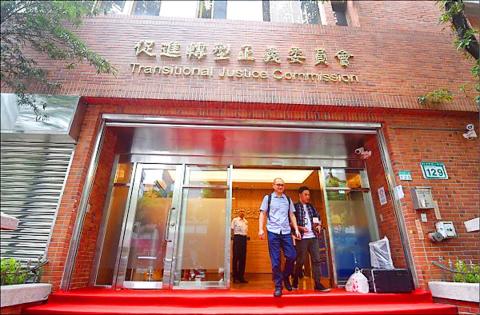The Transitional Justice Commission might be unable to review 60,567 classified political files from the Martial Law period in the National Police Agency (NPA) archives due to difficulty in the declassification process, a commission member said yesterday.
The commission is in the process of gathering political files from the period, which it hopes to cite in a draft report on transitional justice that it is to complete by the end of next year.
Under the Act on Promoting Transitional Justice (促進轉型正義條例), the commission should gather, compile and preserve political files relevant to the suppression of democracy and freedom during the authoritarian era.

Photo: Chen Yu-fu, Taipei Times
The commission this year met with the National Security Bureau (NSB), Ministry of National Defense, Ministry of Justice’s Investigation Bureau and the NPA to negotiate the declassification of political files and their handover, the commission member said, speaking on condition of anonymity.
As part of the sixth planned file handover, the Investigation Bureau plans to transfer 30,571 files to the commission, they said, adding that it has so far handed over 7,919, of which 9 percent are classified.
The NSB has 176 classified files that the commission hopes to receive, the member said.
Under archive regulations, before transferring classified files to another agency, individual agencies must first review their classification, but some of the agencies have maintained a “reserved attitude,” affecting the declassification process, the member said.
As a result, more than 60,000 classified files at the NSB and the NPA might not be declassified or cited in the report, they said.
The NSB’s classified files are believed to include information that could lead to the truth about the murder of former Democratic Progressive Party chairman Lin I-hsiung’s (林義雄) twin daughters and mother at their Taipei home on Feb. 28, 1980.
As Lins’ house was under close surveillance by police and secret service agents at the time, some believe that the murder was planned by the government as a warning to those involved in the democracy movement.
The NPA’s classified files, preserved at the agency’s office in Taipei’s Zhongzheng District (中正) and two warehouses in Liuzhangli (六張犁), include files on political figures, surveillance operations, Chinese espionage and other national security cases, the member said.
If declassified, they would shed light on how the party-state deployed police resources during the authoritarian era, they said.
With assistance from the commission, the NPA is to digitize and copy about 8,000 political cases before handing them over.
The agency would handle the files in a transparent manner, NPA Director-General Chen Ja-chin (陳家欽) said.
It has hired personnel to deal with the digitization and copying, but the process could take some time due to the number of files involved, he said, adding that after a meeting with commission representatives, the agency took them to the warehouses to look at files.
Most of files from more than a decade ago are only available in paper format and require more processing, as they are fragile, he said.
The commission can contact the NPA’s executive secretary if it finds files that it considers particularly important, he said.
Commission spokeswoman Yeh Hung-ling (葉虹靈) said that there are two ways for the commission to access classified files from government agencies.
Agencies can declassify files in their own archives, but if lawmakers pass the proposed political data act, any classified files from more than three decades ago could be declassified unless that is explicitly prohibited by law, she said.

Taiwan is stepping up plans to create self-sufficient supply chains for combat drones and increase foreign orders from the US to counter China’s numerical superiority, a defense official said on Saturday. Commenting on condition of anonymity, the official said the nation’s armed forces are in agreement with US Admiral Samuel Paparo’s assessment that Taiwan’s military must be prepared to turn the nation’s waters into a “hellscape” for the Chinese People’s Liberation Army (PLA). Paparo, the commander of the US Indo-Pacific Command, reiterated the concept during a Congressional hearing in Washington on Wednesday. He first coined the term in a security conference last

Prosecutors today declined to say who was questioned regarding alleged forgery on petitions to recall Democratic Progressive Party (DPP) legislators, after Chinese-language media earlier reported that members of the Chinese Nationalist Party (KMT) Youth League were brought in for questioning. The Ministry of Justice Investigation Bureau confirmed that two people had been questioned, but did not disclose any further information about the ongoing investigation. KMT Youth League members Lee Hsiao-liang (李孝亮) and Liu Szu-yin (劉思吟) — who are leading the effort to recall DPP caucus chief executive Rosalia Wu (吳思瑤) and Legislator Wu Pei-yi (吳沛憶) — both posted on Facebook saying: “I

The Ministry of Economic Affairs has fined Taobao NT$1.2 million (US$36,912) for advertisements that exceed its approved business scope, requiring the Chinese e-commerce platform to make corrections in the first half of this year or its license may be revoked. Lawmakers have called for stricter enforcement of Chinese e-commerce platforms and measures to prevent China from laundering its goods through Taiwan in response to US President Donald Trump’s heavy tariffs on China. The Legislative Yuan’s Finance Committee met today to discuss policies to prevent China from dumping goods in Taiwan, inviting government agencies to report. Democratic Progressive Party Legislator Kuo Kuo-wen (郭國文) said

The Ministry of Economic Affairs has fined Taobao NT$1.2 million (US$36,900) for advertisements that exceeded its approved business scope and ordered the Chinese e-commerce platform to make corrections in the first half of this year or its license would be revoked. Lawmakers have called for stricter supervision of Chinese e-commerce platforms and more stringent measures to prevent China from laundering its goods through Taiwan as US President Donald Trump’s administration cracks down on origin laundering. The legislature’s Finance Committee yesterday met to discuss policies to prevent China from dumping goods in Taiwan, inviting government agencies to report on the matter. Democratic Progressive Party